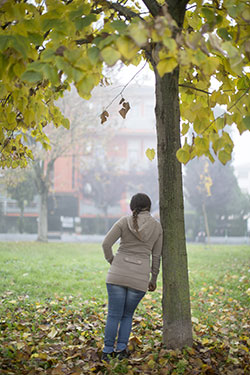FT MBA Challenge 2016: help to tackle human trafficking
Simply sign up to the Business education myFT Digest -- delivered directly to your inbox.
Behind the political arguments now raging about migrant workers and refugees, there is an alarming and more distressing form of migration that often goes unnoticed. It is the human trafficking of tens of millions of poor, vulnerable people into slavery — kidnapped children, forced labourers and women coerced into prostitution. The International Labour Organisation has estimated there are almost 21m victims of human trafficking worldwide.
In a bid to raise awareness of this, one of the world’s fastest growing crimes, the Financial Times is working with Stop the Traffik, an organisation that seeks to raise awareness about human trafficking.
For the 2016 FT MBA Challenge, Stop the Traffik is asking teams of business school students to help the movement build bridges with the business world in order to tackle the issue.

As part of its campaign, Stop the Traffik is launching the “STOP app”, a smartphone application that will enable people to report the signs of human trafficking and forced labour that they see in their day-to-day lives.
“We have now reached the firm belief that only through the co-ordinated gathering and sharing of data at ‘street level’ can we begin to outsmart the traffickers and create an impactful, intelligence-led prevention strategy,” says Ruth Dearnley, Stop the Traffik’s chief executive.
The 2016 challenge
The 2016 FT MBA Challenge is to convince corporate partners to promote the STOP app for collecting grassroots data and then develop the wherewithal to analyse it. If the app is widely adopted, analysts will be able to establish real-time trends on the activities of traffickers and equip those working to prevent trafficking with timely actionable data.
Registered teams for the MBA Challenge will submit a short proposal on how to convince corporate partners to engage with the STOP app at each stage of its life cycle.
Shortlisted teams will then be asked to create a 12-page business plan on their proposal. They will tackle fundraising, marketing communications efforts and data collection and analysis.
The challenge is open to teams of between three and eight members. As human trafficking is a global issue, one member from each team must be based in Europe, a second in the Americas and a third in Asia or Africa. At least one participant in each team must be studying for an MBA (including EMBAs and online MBAs) at the point of registration, but the rest could include university-level students or graduates from disciplines such as business, data analysis, international politics or other topics.
The team must consist of members from at least two different universities/ schools. Please read the FAQ at ft.com/mba-challenge-faq.
Solutions are desperately needed to help Stop the Traffik raise awareness and equip communities, governments and businesses to spot the signs of people trafficking and forced labour.
Past challengers
This is the fifth year that the FT has run the MBA Challenge. In previous years the Challenge teams have tackled: the social stigma attached to wearing glasses for young people in developing economies; the problems faced by children and young people in education worldwide; and the logistical problems of delivering life-saving cancer drugs to children in developing economies.
In 2015, the MBA Challenge teams worked with the International Rescue Committee to address issues of child vaccination. In Uganda one in five children miss being vaccinated against preventable diseases and the 2015 winning team developed a way of using data collected through pregnancy and birth rates to help anticipate the demand for vaccines. “With this data, it is possible to schedule children in need of vaccination to go to their nearest health centre at a set time,” the group’s business plan said. “Schedules will ensure that the rural populace will get the service they need.”
To enter:
The deadline for team registrations is April 29 2016. Winners will be announced in October 2016.
The FT is running a matching service for individuals seeking to join a team. For more information, visit ft.com/mba-challenge or email mba.challenge@ft.com
This article has been amended to show that participants in the challenge can include both students and graduates. The challenge is open to those studying EMBAs and online MBAs. A link to the FAQ was also added.
Comments